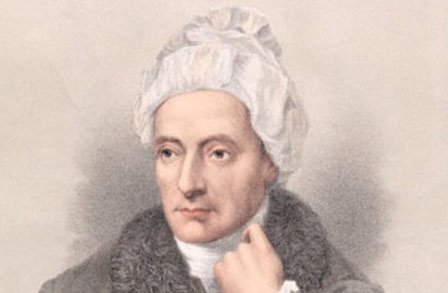It is typical for preachers such as I in an attempt to bring encouragement to people struggling through difficult times to quote from the hymn whose first line is ‘God Moves in a Mysterious Way’. We will often along with that tell something of what we know of the hymn’s author, William Cowper.

We will tell how he was a pastor and a poet, and friends of the famed John Newton, the author of the hymn ‘Amazing Grace’. And finally we will point out how Cowper dealt with severe affliction, that he struggled with mental health issues and that he was hospitalized numerous times, sometimes after attempts on his own life. Given that context we will then encourage people to reflect on lines from the hymn:
You fearful saints, fresh courage take;
the clouds you so much dread
are big with mercy and shall break
in blessings on your head.
And from this, we hope people will find comfort.
But did Cowper find comfort from these words himself? That he did not is the possibility that hymn scholar Erik Routley in his book I’ll Praise My Maker suggests.
Routley points out that the bulk of Cowper’s hymns show they were written by a man with a passionate and sensitive heart. His words were often personal, flowing from a heart in love with his savior.
Oh! for a closer walk with GOD,
A calm and heav’nly frame;
A light to shine upon the road
That leads me to the Lamb!
But Cowper, like many sensitive souls, struggled to understand God’s providence when it took dark and inexplicable turns. And so, Routley points out, the words from his hymn on that matter,
Judge not the Lord by feeble sense,
But trust him for his grace;
Behind a frowning providence
He hides a smiling face.
are completely true and deeply hopeful. But, coming from the pen of Cowper, they are oddly lacking anything personal or emotional. They lack, that is, Cowper’s heart.
The whole hymn exhorts men to trust in God and not to enquire into His ways, which is well enough so far as it goes….
But what astonishes the careful reader is surely this, that here is a man who had both plumbed the depths of suffering and scaled the heights of faith, who wrote so passionately of his Saviour as he did in “There is a fountain filled with blood”,…yet, when he would advise men upon the inscrutability of God’s Providence, he makes no mention whatever of the Saviour of the world, and does not so much as mention the word “grace”.
How can Cowper, after all his experience and all his exhortation, write a hymn of providence that makes no mention of redemption?…Something is wrong here…. (page 110)
I’m not sure that there is something actually ‘wrong’ here, but something is clearly missing. How can that be explained?
Sometimes we find ourselves in those hard places where we are torn between the pain that hurts so badly and the truth that we are supposed to believe. All that we can really do in the midst of that agony may be to recite what we know to be true even though it seems distant from our hearts. Sometimes all we have strength to do is to sing, or in Cowper’s case write, what we are having trouble believing so that we might come around to the place where in fact we do believe and our hearts can again rejoice.
This is the ‘I believe’ part of the complete confession, ‘I believe; help my unbelief.’ (Mark 9:24) We do believe, but contentment eludes when the horror of what we are experiencing and feeling overcomes us.
Perhaps in his own way, Cowper, struggling with the incomprehensible darkness of mental illness, is showing us a path. In the dark we confess the truth that we know until the light comes to illuminate it to our hearts. Perhaps this hymn itself moves in a mysterious way.
